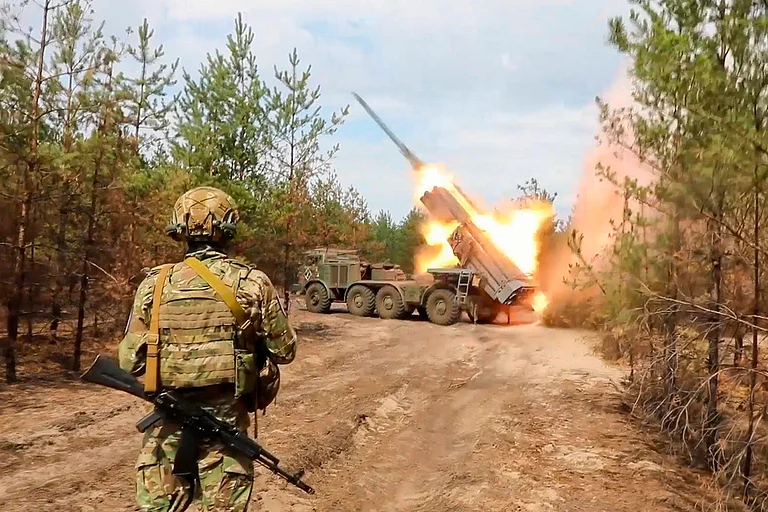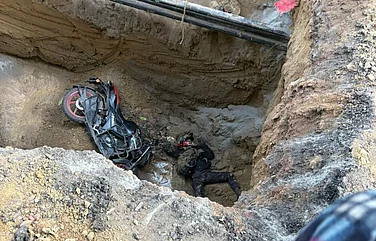In an eventful weekend in Odisha, two Italians were discovered to have been abducted by the Communist Party of India— Maoist (CPI-Maoist); two policemen from the state’s bomb squad were killed, and a third was injured, while attempting to defuse a landmine planted by the Maoists at Alampada in the Koraput district; and a civil contractor was shot dead by the rebels in Bargarh district. Despite the many reverses the Maoists have suffered— especially in terms of loss of leadership— over the past years, their ability to plunge the state into a crisis of impotence appears to be undiminished.
Much of this would have passed unnoticed, were it not for the abduction of the Italian duo— the first such incident orchestrated by the Maoists, involving foreigners— which set off strident speculation about a ‘shift in Maoist strategy’ and an imminent ‘escalation’ of Maoist operations.
The reality of the abduction, however, is that it is little more than an incident of opportunity— most likely a ‘one off’ event— for which the ‘victims’ are as responsible as the perpetrators. Boscusco Paolo, a small-time ‘adventure tour’ operator, and Claudio Colangilo, a tourist, had no business to be in the area where they were “arrested”, as a Maoist audio release to the media expressed it. Their offence, according to the Maoist release, was that like “hundreds of foreign tourists”, they "treat the local people as monkeys and objects of ridicule.” Indeed, in February 2012, after tour operators offered tours of the areas inhabited by the primitive and reclusive Bonda tribe, the state government had restricted tours to all tribal areas in the state. Reports indicate that Boscusco had sought, and had been refused, permission to tour the tribal belt in the Saroda area of Ganjam district in the heavily Maoist-affected Andhra-Orissa Border Special Zone (AOBSZ), but had wilfully chosen to ignore authorities.
The Maoists have raised a list of 13 demands as their condition for release of Boscusco and Colangilo. Most of these reiterate demands raised earlier, during the abduction of Malkangiri District Collector R. Vineel Krishna, just over a year ago. Krishna was abducted on February 16, 2011, and remained in Maoist custody for eight days, to be released after the state government accepted 10 of a 14-point charter of demands. In the present case, the Maoists initially rejected mediation on the grounds that the state government had failed to fulfil the commitments it made in February 2011.
The demands now being raised by the Maoists prominently include an immediate halt to all anti-Maoist operations in the state, as well as the release of some 600 Maoists in jail, including Subashree Panda aka Milli, the wife of the local Maoist leader, Sabyasachi Panda, Secretary of the Odisha State Organising Committee, who controls the Bansadhara and Ghumsur ‘divisions’, which include the Kandhamal and Ganjam districts, the area Boscusco-Colangilo were moving through at the time of their abduction. Other prominent leaders whose release has been demanded include Gananath Patra, an elderly CPI— Marxist-Leninist (CPI-ML) leader, and advisor to the Maoist-backed Chasi Mulia Adivasi Sangha (CMAS)-Narayanpatna, who had already been granted conditional bail, with a restriction on his return to Narayanpatna, but who has refused to move out of jail; and Ashutosh Soren, said to be a member of the Maoist’s Central Military Commission (CMC), arrested from Raurkela in Sundargarh district on March 2, 2009.
At the time of writing, the Maoists had proposed three intermediaries to negotiate the release of the Italian duo: Narayan Sanyal, CPI-Maoist Politburo member, currently serving a life sentence in Chhattisgarh; Dandapani Mohanty, one of the three negotiators nominated by the Maoists during the Vineel Krishna crisis; and Biswapriya Kanungo, Odisha-based human rights activist-cum-lawyer, who is also the advocate representing Sabyasachi Panda’s wife Subashree Panda. Chief Minister Naveen Patnaik had already made an appeal to the Maoists, asking them to release the Italians “on humanitarian grounds” at the same time insisting that his government was willing to negotiate with the Maoists “within the ambit of the law”.
It is significant that, during the Vineel Krishna abduction episode, union home minister (HM) P. Chidambaram had advised Odisha Chief Minister Patnaik not to accept any demand leading to the release of jailed Maoists as this would set an ‘improper precedent’. On that occasion, Patnaik chose to act otherwise, and there is little reason to believe that the state government will demonstrate any greater resolve in the present case, particularly since foreigners are involved, even though it is unlikely that the Maoists would be willing to inflict particular harm on the abductees.
There is little reason to believe that the abduction of the Italians represents any dramatic shift in Maoist strategy or tactics, or that such incidents are likely to become commonplace in the foreseeable future— unless encouraged by exceptional feebleness on the part of the state. Indeed, Sabyasachi Panda, who has claimed responsibility for the ‘operation’, is regarded as something of a maverick within the Maoist hierarchy, and has, on at least one occasion, attracted disciplinary action within the organization, in the wake of the Kandhamal riots of 2008. The riots followed the assassination, in August 2008, of Swami Laxmananda Saraswati of the Vishwa Hindu Parishad. Though Panda had been quick to claim the Saraswati killing at that time, in a media interview in February 2012, he admitted that “the timing of the killing of Laxmananda Saraswati in Kandhamal was a mistake,” and sought to shift the blame to “some cadres” who “became restless and killed him.” Reports in the wake of the Kandhamal riots suggested that Panda had acted without Politburo or CC sanction, and that he had briefly been expelled by the Party, though this narrative is given little credence by intelligence sources.
The Boscusco-Colangilo abduction may also be an ill-conceived bid by Panda to establish a greater dominance within the Maoist hierarchy, as he chafes under the control of ‘outsiders’— leaders from Andhra Pradesh who occupy the most significant positions in the pecking order in Odisha. While Panda, as secretary of the state organizing committee, is the most important Odia leader in the state, he is far from the most powerful Maoist leader in Odisha. He has dominant influence, at best, in four districts— Rayagada and Gajapati in the ‘Bansadhara division’, and Kandhamal and Ganjam in the ‘Ghumsur division’— and even within this jurisdiction, he remains under the overall command of Modem Balakrishna, a CC member from Andhra Pradesh. In any event, it is the Malkangiri and Koraput areas, currently controlled by Akkiraju Hargopal aka Ramakrishna aka RK, another CC member from Andhra, which lie at the heart of the Maoist insurgency in Odisha, and Panda has little influence there.
Significantly, despite a measure of operational stasis across and around these areas, there have been important security force (SF) successes in the recent past. Specifically, Chitrakam Reddy aka Sitru, an ‘area commander’ for Bhadhugoan in the Koraput district, was killed by the police on January 26, 2012, at the Badamathur village. Recent arrests include
- Chenda Bhusanam aka Ghasi, an important leader of the Andhra Odisha Border Special Zonal Committee (AOBSZC);
- Prashant alias Shiva Munda alias Lambu, the second in command in the Maoist hierarchy controlling the Saranda Forest in Jharkhand;
- Girish Mahato, who had been assigned to revive the organisation in the western Odisha districts of Sambalpur and Deogarh;
- Rama Mahanta alias Dadhi Mahanta, ‘area commander’ for the Digha and Bhalulata areas in Sundargarh district;
- Kunduru Luhar alias Golapa, an 'area commander' in Digha;
- Pitabas Singh Thakur, who worked with the Daraba Dalam (squad) of Chhattisgarh and was a close associate of Surendra, the Daraba Dalam commander who had allegedly masterminded the killing of 76 SF personnel in Dantewada district on April 6, 2010; and
- Satrughan Biswal alias Mangu alias Mohan, an active member of the Odisha state organising committee of the CPI-Maoist.
In addition,
- Dunna Kesava Rao aka Azad, believed to be a ‘deputy’ to Sabyasachi Panda, surrendered in Hyderabad (Andhra Pradesh) on May 2011.
Another two of Panda’s close associates have recently fallen into the state’s custody.
- Rajendra Kumar Ratia aka Suraj aka Sangram, who served as Panda’s bodyguard, surrendered before Police in the Ganjam district on February 3, 2012.
- A female Maoist, Malati Majhi aka Lata, who was also involved in Panda’s personal security, was arrested on February 15, 2012.
The wider AOB region is also being brought under sustained long-term pressure. Specifically, the centre is speeding up projects to set up paramilitary and special forces bases in the north coastal districts of Andhra Pradesh, abutting the most troubled areas in Odisha. The Border Security Force (BSF) is already in the process of establishing a base in Srikakulam, abutting Ganjam, Gajapati and Rayagada; while the India Reserve Battalion (IRB) is to establish a camp at Anandapuram in Viskhapatnam, abutting Koraput and Malkangiri. The Central Reserve Police Force (CRPF) now plans to establish its regional base in the Kottavalasa mandal in the Vizianagaram, abutting Rayagada and Koraput.
In the current situation, it would appear that the state government is moving, once again, towards accepting another humiliating capitulation. In itself, this would matter little— there can be no great loss of face in succumbing to blackmail when lives may (even arguably) be at stake. What is crucial, however, is the state’s response after the crisis is over. Indeed, far more than the current abduction, it is the conduct of the state government and its intelligence and police apparatus, since the Vineel Krishna abduction, that demands close scrutiny. Unfortunately, even the most cursory examination would indicate that, in the last year, Odisha has done little, in the first instance, to bring the guilty in that case to book; equally little to neutralize the Maoist threat; and almost nothing to ensure that such incidents do not recur, and that the state is not held hostage again and again. The Vineel Krishna episode, in fact, marks the abrupt deceleration of the very limited anti-Maoist operations in Odisha, and a widespread demoralization of state police forces. Given the current orientation of the state’s political and police leadership, it seems unlikely that any dramatic change of strategy or operational intensity will follow the inevitable resolution of the present crisis. Under such circumstances, Odisha can only remain vulnerable to increasing Maoist disruption, particularly as violence escalates, with SF pressures building up along the state’s borders with Andhra Pradesh.
Ajai Sahni is Editor, SAIR; Executive Director, Institute for Conflict Management & SATP. Fakir Mohan Pradhan is Research Associate, Institute for Conflict Management
Edited March 26, 2011: Narayan Sanyal currently serving a life sentence in Chhattisgarh was earlier wrongly mentioned as being in Giridih Jail in Jharkhand


























